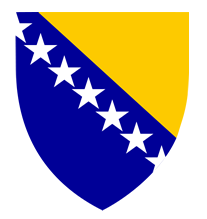Bosnia and Herzegovina: Government
Key Figures
- Chief of State:
- Chairman of the Presidency Denis Becirovic
- Head of Government:
- Chairman of the Council of Ministers Borjana Kristo
Overview
- Government Name:
- Bosnia and Herzegovina
- Constitution:
- Adopted: 1995; Focuses upon the protection of human rights and fundamental freedoms in Bosnia and Herzegovina. Also detailed in the Constitution are the responsibilities of and relations between the institutions of Bosnia and Herzegovina and the entities; the structure of the parliamentary assembly; powers of the president; constitutional court; finances; and various amendments.
- Government Type:
- Parliamentary Republic

Index of Economic Freedom
Country Risk Rating
Government Branches
| Main Powers | Election Process | Election Cycle 1 | |
|---|---|---|---|
| Executive | The chair of the presidency comprises three members. It is the head of state and is responsible for foreign policy and proposing a budget. |
The three chairs of presidency are elected directly by the people to serve rotating eight-month terms for a four-year period as presidency members. |
4 years |
| Judicial | The constitutional court is the supreme, final arbiter of legal matters. |
The constitutional court is composed of 9 members selected to serve 5-year terms. Four members are elected by the house of representatives of the Federation, two by the assembly of the Republic of Srpska, and three by the president of the European Court of Human Rights. |
Mandatory retirement age of 70 with renewable 6-year terms |
| Legislative | The parliamentary assembly is the main legislative body of Bosnia and Herzegovina and consists of the house of peoples and the national house of representatives. Collectively, they are tasked with implementing the presidency's decisions, deciding revenues for institutions, upholding international obligations, approving the national budget, and ratifying treaties and agreements. |
The house of people has 15 delegates who serve two year terms. The house of representatives has 42 members who are elected by the people under a system of proportional representation to serve a four-year term. |
4 years |
Regional Trade Blocs
International Organization Participation [2]
Environmental Agreements [3]
Tax Information [2]
- Tax Authority:
- Information not available
- Tax Name:
- Information not available
Sources:
- ElectionGuide http://www.electionguide.org/
- EY, http://www.ey.com
- CIA World Factbook, https://www.cia.gov/the-world-factbook/
- U.S. Bilateral Relations Fact Sheets http://www.state.gov/r/pa/ei/bgn/


